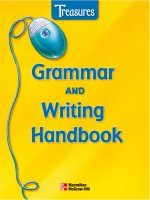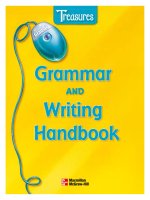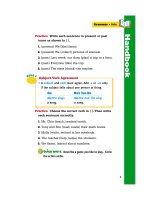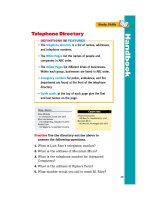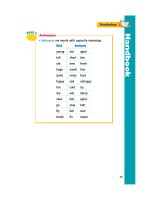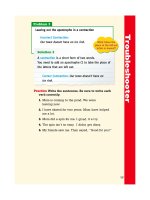treasures grammar and writing handbook grade 1 phần 2 ppt
Bạn đang xem bản rút gọn của tài liệu. Xem và tải ngay bản đầy đủ của tài liệu tại đây (264.95 KB, 12 trang )
Name
Subjects
• The naming part of a sentence can also be
called the subject.
• The subject tells who or what the sentence
is about.
Mike reads a riddle. The riddle is funny.
11
Handbook
Grammar
•
More About Sentences
R
U
L
E
1
Predicates
• The action part of a sentence can also be
called the predicate.
• The predicate tells what the subject does.
Myra helps her sister.
R
U
L
E
2
Draw a under the subject of each sentence.
Draw a circle around the predicate of each sentence.
1. owns a flower shop.
2. are beautiful.
3. need water to live.
4. are red.
5. works in the shop, too. Mike
The flowers
Plants
The roses
Maria
line
Practice
Handbook
Grammar
•
More About Sentences
Combining Subjects
• Sometimes two sentences have the same
predicate but different subjects.
• Then you can join the two subjects. Use the
word and between the two subjects to make
a new sentence.
Lucia got flowers. Kathy got flowers.
Lucia and Kathy got flowers.
12
R
U
L
E
3
Use and to combine the underlined parts. Tell the
new sentence.
1. went to the shop. went to the shop.
2. saw vases. saw vases.
3. are sold. are sold.
FlowersPlants
FloydJess
GirlsBoys
Practice
McGraw-Hill School Division
Name
Combining Predicates
• Sometimes two sentences have the same
subject but different predicates.
• Then you can join the two predicates. Use the
word and between the two predicates to
make a new sentence.
Jake sits. Jake reads.
Jake sits and reads.
13
Handbook
Grammar
•
More About Sentences
R
U
L
E
4
Use and to combine the underlined parts. Tell the
new sentence.
1. Mark . Mark .
2. Pablo . Pablo .
3. We . We .
4. Billy . Billy .
jumpsruns
play the harpplay the drums
paintsdraws
foldscuts
Practice
Handbook
Grammar
•
Pronouns
He, She, It, They
• A pronoun is a word that takes the place
of a noun.
• He, she, and it are pronouns that tell about one.
José he Tanya she book it
• They is a pronoun that tells about more
than one.
Ken and Tess They
14
R
U
L
E
1
Look at the word or words in dark type. Tell a pronoun
that can take its place.
1. Tess has a jump rope.
2. The jump rope is green.
3. Ken lives next door.
4. Mom helps turn the rope.
5. Matt and Jen want to play, too.
Practice
McGraw-Hill School Division
Name
I
and
Me, We
and
Us
• I, me, we and us are pronouns.
• Use I and we as the subject of a sentence.
I give Pam my book.
We read the book.
• Use me and us in the predicate of the
sentence.
Pam gives me the book.
The baby smiles at us.
15
Handbook
Grammar
•
Pronouns
R
U
L
E
2
Draw a circle around the correct pronoun.
1. want to play.
IMe
2. Can Nick play with ?
Ime
3. sing to Cara.
We Us
4. Then Cara reads to .
we us
5. pick a good book.
We Us
Practice
Sentences
• Every sentence ends with an end mark.
• A statement is a sentence that tells
something. It ends with a period.
I have a bird named Dot.
• A question is a sentence that asks something.
It ends with a question mark.
Do you like birds?
• An exclamation is a sentence that shows strong
feeling. It ends with an exclamation mark.
What a fun bird she is!
Mechanics • Sentence
Punctuation
16
McGraw-Hill School Division
Handbook
Mechanics • Capital Letters
Name
17
Handbook
Add the correct end mark to each sentence. Draw a circle
around letters that should be capital letters.
1. where is dot
2. she rests in the sun
3. oh, look at her run
4. dot is my pal
5. i have lots of fun with her
Practice
Capitals
• Begin a sentence with a capital letter.
We swim in the pool.
• Use a capital letter to write I or a
special name.
Jim and I play ball.
• Begin the names of days of the week and
months with capital letters.
Wednesday September
18
Handbook
McGraw-Hill School Division
Mechanics
•
Abbreviations
• An abbreviation is a short form of a word.
• Begin an abbreviation with a capital letter.
• End it with a period.
Dr. Long Mr. Bill
Mrs. Lee Ms. Apple
Abbreviations
Draw a circle around the abbreviation in each sentence.
Then write each sentence correctly.
1. Ms Wong has a sick pet.
2. dr bell is the vet.
3. Will mr French help the vet?
4. The sick pet is called mrs Smith!
5. mr Fox has a sick pet, too.
Practice
Name
Handbook
Contractions and Apostrophes
• A contraction is a short form of two words.
• Use an apostrophe to show where a letter
or letters are missing.
is not = isn’t are not = aren’t
was not = wasn’t were not = weren’t
has not = hasn’t have not = haven’t
do not = don’t did not = didn’t
does not = doesn’t
’
Mechanics
•
Contractions
and Apostrophes
Practice
19
Use an apostrophe in place of the o in not.
Write each contraction.
1. have not
2. did not
3. is not
4. are not
5. do not
6. was not
Mechanics
•
Letter
Punctuation
Handbook
Capitals and Commas
• Begin each word in the greeting of a letter
with a capital letter.
Dear Hank, Dear Grandma,
• Use a comma after the greeting.
Dear Sally,
• Begin the first word in the closing of a
letter with a capital letter. Use a comma
after the closing.
Your pal,
Complete this letter to a friend. Add a greeting and a
closing. Sign your name. Remember to use capitals and
commas correctly.
Practice
McGraw-Hill School Division
Do you want to play with
me after school? I have a
new game.
Greeting
Your name
Closing
20
Mechanics
•
Book Titles
Name
• Begin the first word of a book title with a
capital letter.
• Begin other important words in the title
with a capital letter.
Caps for Sale
Book Titles
21
Handbook
Write each title correctly.
1. my dog’s the best!
2. sitting in my box
3. a day at the zoo
4. where’s the cat?
5. max in school
6. red fox
7. goodnight moon
8. the little red hen
Practice
Handbook
22
McGraw-Hill School Division
Library
Handbook
McGraw-Hill School Division
Draw a circle around the answer to each question.
1. What kind of book tells a story about a talking hippo?
fiction nonfiction
2. What kind of book gives facts about cats?
fiction nonfiction
3. What kind of book would you find in the
reference section?
fiction encyclopedia
Practice
• A library has books. A library has newspapers,
magazines, tapes, and computers, too.
• Books that tell stories are called fiction.
They are arranged in ABC order by the
author’s last name.
• Books that tell facts are called nonfiction.
They are grouped by topic.
• A library has dictionaries and encyclopedias.
They are kept in the reference section.
DEFINITIONS AND FEATURES
